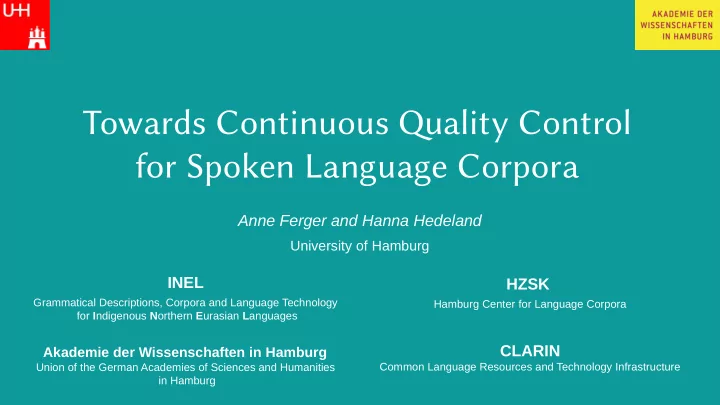

Towards Continuous Qvality Control for Spoken Language Corpora Anne Ferger and Hanna Hedeland University of Hamburg INEL HZSK Grammatical Descriptions, Corpora and Language Technology Hamburg Center for Language Corpora for I ndigenous N orthern E urasian L anguages CLARIN Akademie der Wissenschaften in Hamburg Union of the German Academies of Sciences and Humanities Common Language Resources and Technology Infrastructure in Hamburg
Aim of the Presentation Our approach on optimizing a linguistic data creation and • curation workflow aiming towards continuous integration of speech corpora The data we work with • Our framework and practical issues we overcame • Our perspective • IDCC19 Tuesday 5 February Melbourne 2
Language Corpora Structure of a spoken language corpus IDCC19 Tuesday 5 February Melbourne 3
Exemplary Data in the INEL Project Language Data with and without audio and video • transcriptions in XML format • Metadata diverse corpus-wide metadata • in XML and CMDI format • IDCC19 Tuesday 5 February Melbourne 4
Qvality Management for Spoken Language Corpora Existing linguistic data creation and curation workflow: ● mostly manually and non-reproducible In our case: Creating searchable, consistent language ● corpora that can be used for quantitive or qualitative analysis Publishing that corpora in a Fedora repository ● Completely automated curation is not possible because it ● would require unacceptable constraints on the creation of the data IDCC19 Tuesday 5 February Melbourne 5
Users and Maintainers of Our Approach IDCC19 Tuesday 5 February Melbourne 6
Our Approach Why do we need continuous quality control for spoken language corpora? • Limiting (expensive) manual work • Avoid unnecessary data curation • Increasing the amount of automatic enhancements of the data • Creating high quality resources suitable for difgerent research needs • Making the publishing of the resources as fast, spontaneous and easy as possible • Enabling the conversion of the data into various difgerent formats IDCC19 Tuesday 5 February Melbourne 7
Formalizing the Workflows IDCC19 Tuesday 5 February Melbourne 8
Using Git for Version Control Using a git workflow IDCC19 Tuesday 5 February Melbourne 9
The Modules Used for Our Approach IDCC19 Tuesday 5 February Melbourne 10
Specific Git Solutions I Using difgerent branches for publication IDCC19 Tuesday 5 February Melbourne 11
Specific Git Solutions II Displaying the git repository as a folder on a shared drive IDCC19 Tuesday 5 February Melbourne 12
Specific Git Solutions III Scripts to let users work with git without noticing it IDCC19 Tuesday 5 February Melbourne 13
Automatically Supported Workflows I Using a plugin in the project management sofuware git to automatically create issues to be carried out IDCC19 Tuesday 5 February Melbourne 14
Automatically Supported Workflows II Using a plugin in the project management sofuware git to automatically create issues to be carried out IDCC19 Tuesday 5 February Melbourne 15
Automatically Supported Workflows III Not only create, but also (partly) carry out the required issues automatically for users in another infrastructure IDCC19 Tuesday 5 February Melbourne 16
Qvality Control I A framework to gather existing checks and fixes in a consistent and reusable way IDCC19 Tuesday 5 February Melbourne 17
Qvality Control II Html error list along with XML error lists that can be opened in the sofuware used to produce the data IDCC19 Tuesday 5 February Melbourne 18
Qvality Control III IDCC19 Tuesday 5 February Melbourne 19
Qvality Control III - Example IDCC19 Tuesday 5 February Melbourne 20
Summary Conclusions Technical solutions for non- ● technical users are needed Git for Humanities ● Technical support will still be ● needed for Humanities projects Adaptability to other data Technical support will be needed ● for the project Resources should be versionable ● using Git IDCC19 Tuesday 5 February Melbourne 21
Perspective Enhance the hidden versioning ● Make the workflows more open to external projects/users ● Enhance the GUI options ● Adapt Framework to be even more user-friendly and robust ● IDCC19 Tuesday 5 February Melbourne 22
Acknowledgements INEL htups://inel.corpora.uni-hamburg.de/ Project leader Prof. Dr. Beáta Wagner-Nagy (IFUU, Universität Hamburg) Applicants Prof. Dr. Beáta Wagner-Nagy, Dr. Michael Rießler, Hanna Hedeland, Timm Lehmberg Researchers/Developers Dr. Alexandre Arkhipov (Research Coordinator), Timm Lehmberg (Technical Coordinator), Dr. Maria Brykina, Chris Lasse Däbritz, Anne Ferger, Dr. Valentin Gusev, Daniel Jettka, Dr. Svetlana Orlova HZSK/CLARIN htups://corpora.uni-hamburg.de Spokesperson/Project leader Prof. Dr. Kristin Bührig Managing director Hanna Hedeland, M.A. Deputy Managing Director Daniel Jettka, M.A. Researchers/Developers Tommi Pirinen, PhD Hanna Hedeland, M.A. IDCC19 Tuesday 5 February Melbourne 23
Thank you! Contact: anne.ferger@uni-hamburg.de hanna.hedeland@uni-hamburg.de inel@uni-hamburg.de corpora@uni-hamburg.de IDCC19 Tuesday 5 February Melbourne 24
Optional additional Information Links: • htups://corpora.uni-hamburg.de • htups://inel.corpora.uni-hamburg.de • htups://exmaralda.org/en/ IDCC19 Tuesday 5 February Melbourne 25
Recommend
More recommend